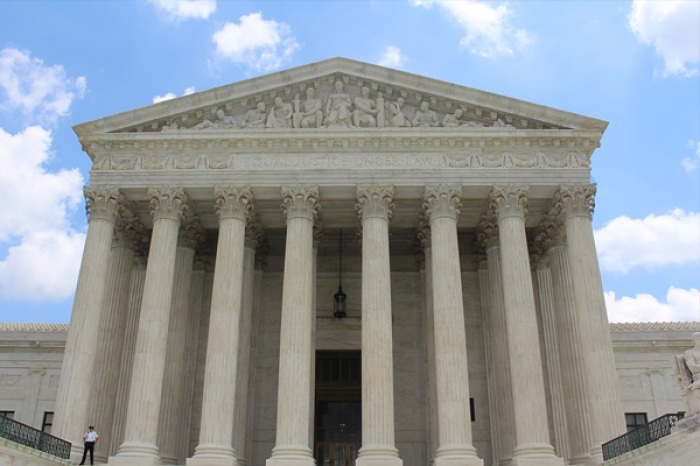Supreme Court allows Trump's transgender military ban go into effect

The U.S. Supreme Court will allow President Donald Trump’s ban on transgender service members in the military to go into effect in a 5-4 decision that did not rule on the merits of the case.
The nation’s high court on Tuesday granted stays requested by the Trump administration in two cases challenging its policy banning transgender service members from serving in the military. The court has effectively allowed the policy to go into effect while lawsuits move forward in lower courts.
The Trump administration policy reversed an Obama administration policy allowing those who suffer from gender dysphoria to serve in the U.S. military and even receive funding for gender transition procedures and therapies.
The five conservative justices on the court voted to grant the stay of the policy while the lower courts rule on the merit of the case. Meanwhile, the court’s four liberal justices would have denied the Justice Department’s application for stay in the cases.
The decision has received praise from conservative evangelicals and has been criticized by LGBT activists.
Trump first promised a ban on military service members in a July 2017 tweet in which he stated that the military would not allow transgender individuals to “to serve in any capacity in the U.S. Military.”
While a longstanding ban on transgender military service members was lifted by the Obama administration in 2016, the Trump administration’s policy lets transgender service members continue to serve if they have already begun to transition.
However, the Trump administration policy released by then-Defense Secretary James Mattis prohibits service members from the beginning transition and would disallow people who have already transitioned to their preferred gender from being able to join the military ranks. It would also disallow people diagnosed with gender dysphoria.
The policy was created after Mattis established a “panel of experts” comprised of senior civilian and uniformed military leaders. Mattis concluded that there were “substantial risks” associated with allowing the “accession and retention” of service members who suffer from gender dysphoria or who have begun to transition to their preferred gender.
According to The Washington Post, the court ruled that the Trump administration policy did not constitute a “blanket” ban on transgender service members because not all transgender individuals have transitioned or are diagnosed with gender dysphoria.
“Allowing Donald Trump & [Vice President] Mike Pence's transgender troop ban to go into effect harms both transgender service members & our national security,” the pro-LGBT Human Rights Campaign tweeted in response to the ruling. “As this critical matter makes its way through the courts, brave trans patriots deserve to have their constitutional rights protected.”
The American Civil Liberties Union claimed in a tweet that the ruling still doesn’t lift the “nationwide block secured in our case, Stone v. Trump, which is before a court in Maryland.”
Sharon McGowan, the legal director for the LGBT law firm Lambda Legal, told PrideSource.com that the Maryland case is on the only remaining nationwide injunction in place against the policy. However, she suspects that the Justice Department will apply for a stay in that case too, given the Supreme Court’s decision in the other two cases.
Shanon Minter, a legal director for the National Center for Lesbian Rights, told the outlet that it is correct to interpret the court’s ruling as meaning that the transgender policy can go into effect.
“The court declined to hear the cases now, which permits our challenges to proceed in the lower courts, but it also is allowing the Trump administration to enforce the ban in the meantime,” Minter said.
Kamala Harris, a Democrat senator from California who recently announced her candidacy for president, called on liberals to “fight back to reverse” the decision.
Social conservatives have long spoken out against plans to allow transgender individuals to openly serve in the military.
One of the most vocal groups has been the Family Research Council, which is headed by retired service members such as Tony Perkins and Jerry Boykin. The group has warned that the push to allow transgender individuals to openly serve in the military is more about a social agenda than improving military readiness.
“It’s refreshing to see the U.S. Supreme Court rein in lower court judges who are bent on telling the commander-in-chief how to run the military,” FRC President and Marine veteran Tony Perkins said in a statement. “Those charged with the difficult and complex work of keeping our nation safe cannot do their job with rogue judges injecting their personal opinions into every social issues case which reaches their courts.”
Perkins had previously spoken out against lower court decisions barring the Trump administration from putting the policy into effect, calling the rulings “judicial activism.”
“With different judges issuing these different opinions all over the country, our nation will quickly become paralyzed,” Perkins said Tuesday. “There is a reason the Constitution so clearly explains that the president is the final authority on military policy. The Constitution grants judges no power to divert military resources away from preparing to fight wars and into social engineering.”
Perkins pointed out that there are “hundreds of conditions or physical limitations” that disqualify people from being able to serve in the military.
“Does that make the military exclusionary? Yes. But the Pentagon isn't in the business of equality,” Perkins asserted. “It's in the business of fighting and winning wars. Either the military's priority is protecting America — or it's helping people on the path to self-actualization. It can't do both.”
“The U.S. Supreme Court is right to leave the responsibility for keeping our military strong and country safe where it belongs: with our commander-in-chief,” Perkins concluded.
Last year, FRC was subpoenaed by LGBT groups suing the Trump administration over the transgender military ban and demanded that FRC leaders turn over all communication they have had on the issue with the Trump administration.
Follow Samuel Smith on Twitter: @IamSamSmith
or Facebook: SamuelSmithCP




























